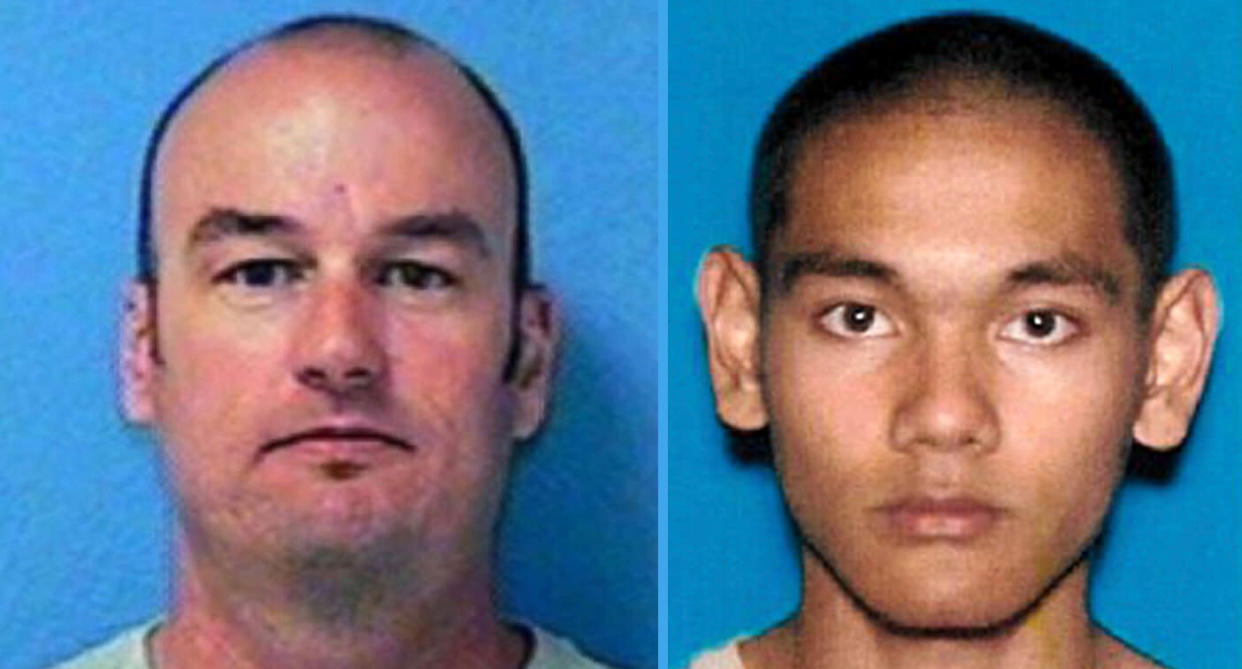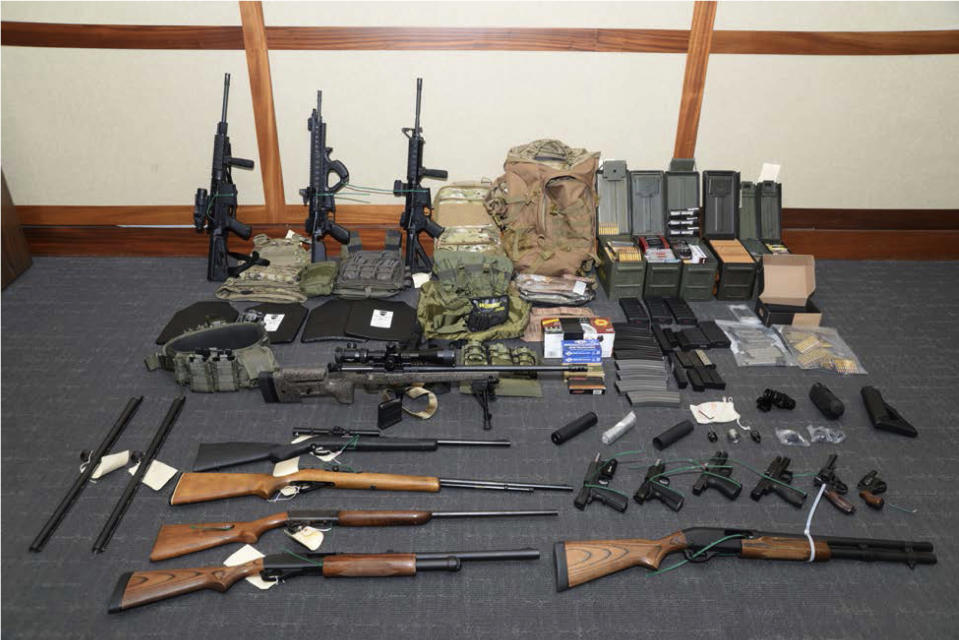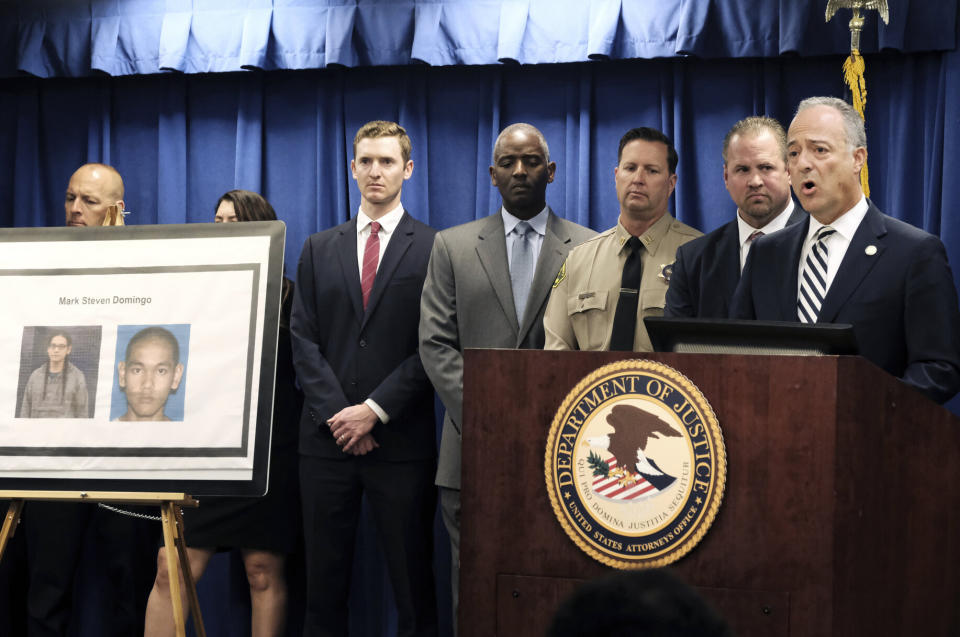Two terror suspects, two very different sets of charges. Why?

Christopher Hasson, a self-proclaimed white nationalist and admirer of Norwegian mass murderer Anders Breivik, had amassed a small arsenal of weapons and an enemies list of political and media figures, according to federal prosecutors who arrested him in February. He was indicted on drug possession and weapons charges and pleaded not guilty; a federal magistrate judge last week said he intended to set conditions for his release from jail while he awaits trial.
Mark Steven Domingo, a 26-year-old Army veteran in Southern California and a recent convert to Islam who according to prosecutors had pledged allegiance to the Islamic State, was arrested last weekend and charged with attempting to provide material support for terrorism after taking steps to bomb a rally in Long Beach, Calif. Accused terrorism suspects are typically held in jail until their trial and sentence.
It’s not as simple as the difference between a white nationalist and a jihadi, although that enters into it. Legal experts say the key factor is that Hasson never took a concrete step toward committing an act of terrorism. He assembled a large number of guns (not illegal and not even particularly unusual in the United States) and wrote troubling messages but never coordinated with other members of a group to take steps toward an attack.
Domingo, however, had posted pro-jihadi messages and was engaged in communication with undercover law enforcement officers discussing his interest in attacking different groups (“Jews, police officers, churches and a military facility,” per the affidavit) as a response to what he considered to be America’s culpability in the New Zealand mosque attacks. The affidavit states that “Domingo said he specifically bought 3-inch nails because they would be long enough to penetrate the human body and puncture internal organs.” When Domingo took receipt of what he thought was an explosive device, he was arrested and charged with material support for terrorism.
There are specific federal statutes covering international terrorism, and some lawmakers think new laws are required to make it easier to prosecute domestic terrorists. A bill proposed by Sen. Dick Durbin, D-Ill., would require federal agencies to issue annual reports on domestic terrorism and codify an interagency domestic terrorism task force, but not create a new charge.

The treatment of terror suspects is a contentious area under federal law. Domingo’s maximum sentence if convicted on the single “material support” count is 15 years. Hasson technically faces up to 31 years in prison if convicted on all four counts and required to serve his terms consecutively, but a terror charge would have added to his potential sentence. If prosecutors believe Hasson is a terror threat, why couldn’t they charge him as such?
Mike German, a Brennan Center for Justice fellow and former federal agent who investigated right-wing extremism, told Yahoo News that between existing terrorism statutes and hate crime legislation, the government had all the tools it needed to prosecute Hasson on more serious charges. German added that the “material support” charge that was applied to Domingo, 2339A, would also apply to domestic terrorists.
“The problem isn’t whether you call the crime terrorism or a hate crime if those crimes are put on an equal plane,” said German. He believes it’s a question of where law enforcement concentrates its efforts. “The FBI’s No. 1 priority is counterterrorism. Civil rights violations are No. 5 priority. All it has to do is change its priorities. Crime that is a hate crime that involves deadly violence and is intended to intimidate a civilian population, which most hate crimes are, it fits the statutory definition of terrorism. Why the Justice Department would pretend it doesn’t is hard to understand.”
German raised as a possible concern that a new domestic terrorism law would make it easier for the FBI to go after groups like Black Lives Matter (in 2017, the FBI classified “black identity extremists” as a terror threat), environmental activists and political protesters such as participants in the “J20” demonstrations in Washington around President Trump’s inauguration. Federal prosecutors charged 234 protesters with felony rioting charges. After the first six defendants were all acquitted by a jury, the Department of Justice dropped all remaining charges.
“You look at cases where they go after far-right extremists, they lose very few of those cases because there’s typically a lot of evidence,” said German. Because those aren’t top priority cases, they are brought only when prosecutors are confident of winning. The other side of the coin is that the government will pursue certain politically marginalized groups on much less evidence. “When you look at the cases that they aren’t winning, like the J20 prosecutions, those are the cases they’d like to win. They’re looking for a broad authority to target the groups they’re already targeting but not winning convictions because they’re not committing violence against human beings.”

John Cohen, former counterterrorism head at the Department of Homeland Security and a professor at Rutgers University, said that while German has a point, a new law might help prosecutors “address this threat where you have inconsistent standards based on the ideological motivation of the attacker.”
“Federal prosecutors believe that there is greater clarity of law to determine when a fact pattern meets the elements of international terrorism as defined by statute than when the fact pattern pertains to criminal activities inspired by domestic extremist ideological beliefs,” said Cohen. “It doesn’t stop investigations, it just impacts what charges are pursued.”
And criminal-justice experts say the recent pattern of attacks is blurring the lines between international, religious, nationalist and other motivations. Some attackers are essentially shopping around for an ideology to justify their anger, says Jeffrey Simon, a guest lecturer at UCLA who has written about lone wolf attacks. He is increasingly encountering a mix of personal grievances with ideologies.
“They would have these personal issues — emotional issue, financial issue, something wrong in their lives — and they find a purpose with some higher ideology, whether that’s an ISIS ideology or a white supremacist ideology, whatever it might be.”
Cohen agreed, adding that the threats are very different than they were five or 10 years ago, when the primary concern was a foreign group recruiting and training a U.S. citizen to commit an attack on its behalf.
“In many respects, these attacks that have been responsible for the attacks we’ve experienced over the last five years, they all share common behavioral characteristics even though they may use different motives to justify their attack. So from a prevention perspective, you’re talking about the same types of people, but you’re having to use different prosecutorial strategies whether they self-connect with the cause of a group like ISIS or with the cause of a neo-Nazi or white supremacy group. From an enforcement perspective, that’s extraordinarily challenging.”
Read more from Yahoo News:



